Wetlands are the ‘kidneys’ of the catchment…
The wonderful wetlands in the region, provide habitat for wading and migratory birds, threatened species and capture and hold flood waters before they enter or re-enter a waterway.
Internationally and nationally significant wetlands
In our region we have a number of significant wetlands and wetland complexes, including two internationally important Ramsar sites and eleven sites listed as nationally important under the Directory of Important Wetlands Australia.
The Thomson and Latrobe catchments include five wetlands and wetland complexes that are listed as nationally important. The lower Thomson and Latrobe catchments contain part of the Gippsland Lakes Ramsar site and the nationally listed Lake Wellington Wetlands and Lake Victoria Wetlands.
South Gippsland has a significant wetland of national and international importance the Ramsar site of Corner Inlet. Four other wetlands of national importance can also be found in South Gippsland.
The videos below take a look at the work of the Heyfield community to restore and manage the Heyfield Wetlands on the outskirts of town and show the work of Sale Field and Game and community volunteers to restore the Heart Morass a wetland adjacent to the Latrobe River.
Wetlands also play a significant role played by in reducing the impact of extreme weather events such as floods, droughts and cyclones.
- In times of excess rainfall, wetlands act as a natural sponge, absorbing and storing water and reducing flood levels
- In dry times, they release stored water, delaying droughts and reducing water shortages
- Wetlands along a coastline provide a natural buffer against extreme weather events and can absorb much of the impact
- Well-managed wetlands can also speed up recovery and ensure communities are resilient and can bounce back better from disasters. They act as natural water filters and nutrient restorers.
Scientists estimate that at least 64 per cent of the world’s wetlands have disappeared since 1900. Meanwhile, the frequency of worldwide disasters has more than doubled in just 35 years, driven by climate- and weather- related hazards like flooding, cyclones and droughts.
And with the rate of extreme weather events predicted to keep on rising due to climate change, it is even more important that we protect our wetlands.
In Gippsland there are many ecologically and recreationally important wetlands, including two Ramsar-listed wetlands, The Gippsland Lakes and Corner Inlet.
West Gippsland Catchment Management Authority works with private landholders as well as community groups to help protect and enhance wetlands in the region.



